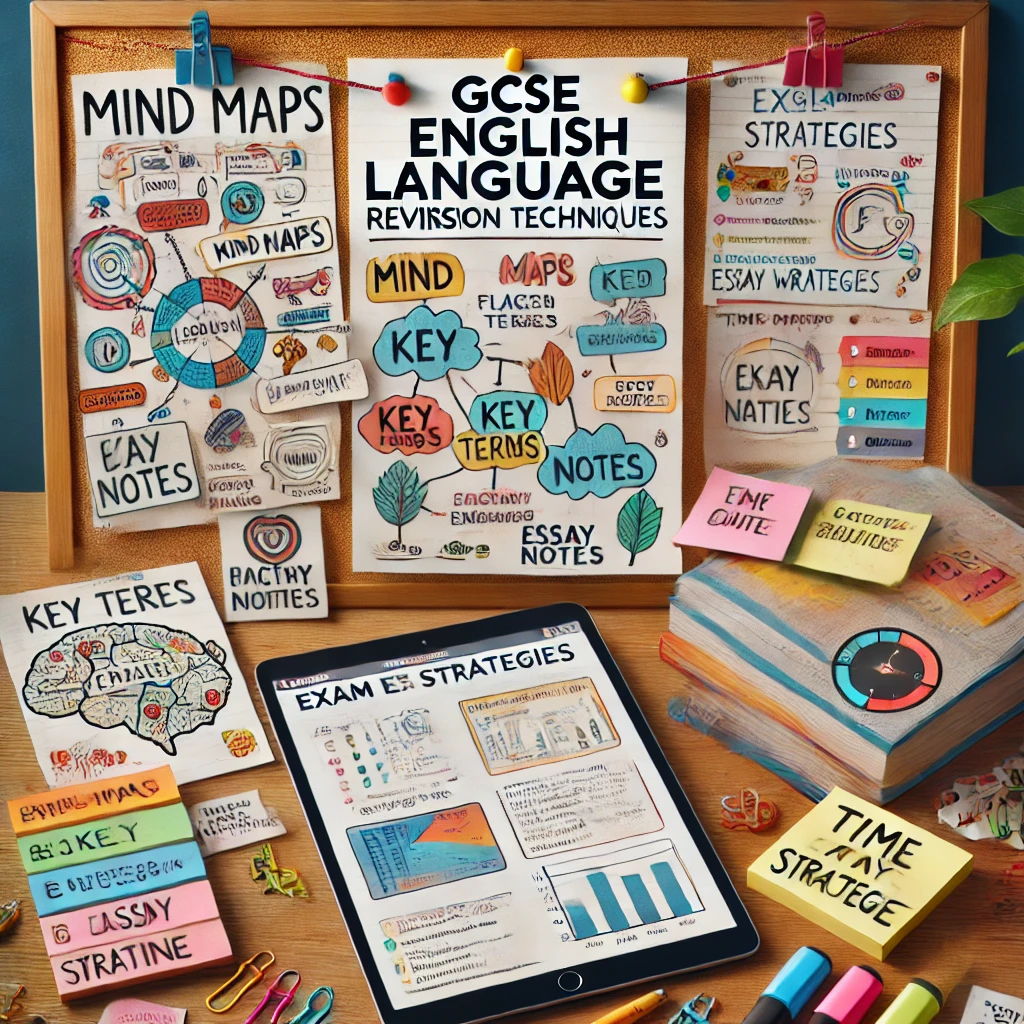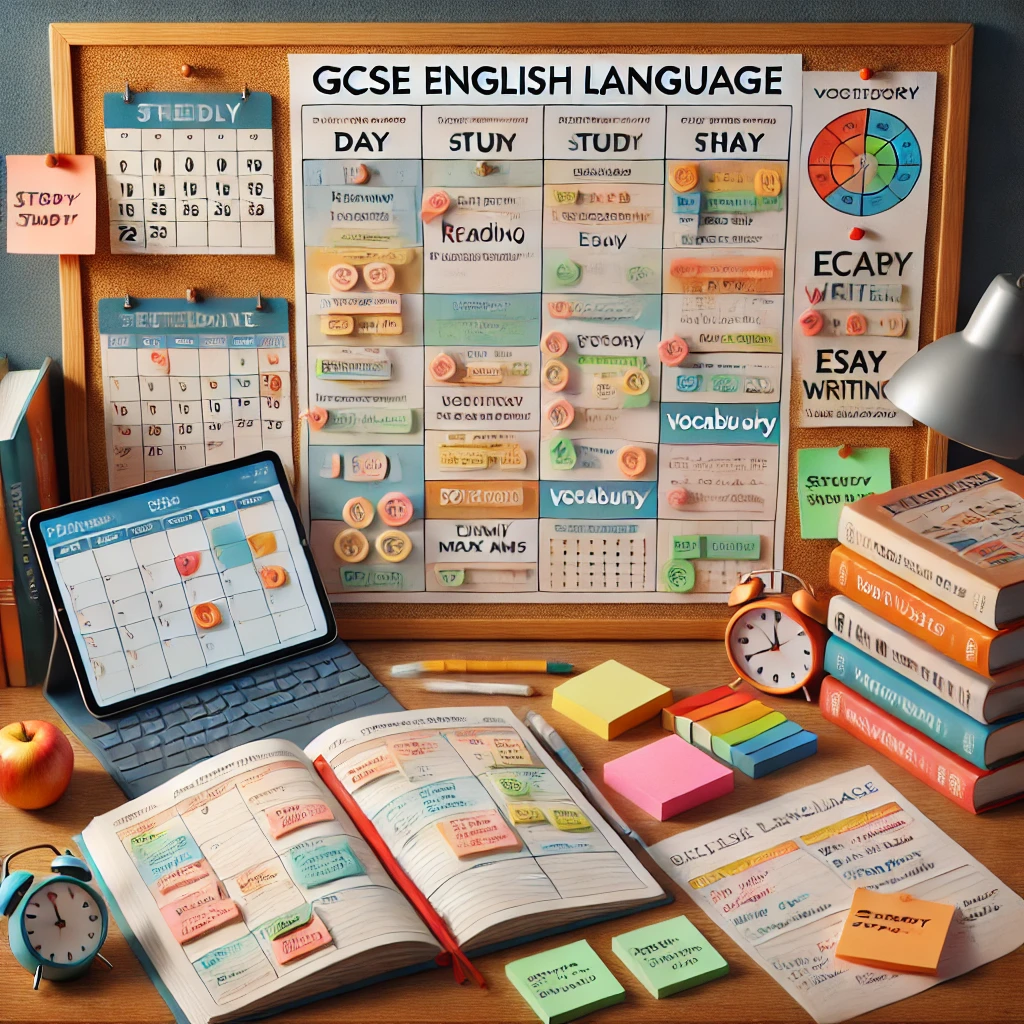
Revising for your GCSE English Language exam is crucial because it lays the foundation for success in both academic and professional life. English Language is not just another subject, it develops essential communication skills, from writing clearly and persuasively to analysing texts critically. Achieving a strong grade can open doors to further education and career opportunities, making it an essential qualification.
Effective revision helps to reinforce key concepts, such as language techniques, grammar, and structuring arguments, ensuring that you’re fully prepared to tackle each section of the exam. With a solid revision strategy, you can boost your confidence, reduce exam stress, and significantly improve your chances of achieving higher scores. Knowing what to expect and how to approach exam questions effectively can make a huge difference on exam day.
How to Revise for GCSE English Language
The first step to effective revision is understanding the structure of the GCSE English Language exam. This exam typically consists of two papers:
- Paper 1: Explorations in Creative Reading and Writing
- Section A: Reading comprehension. You will be asked to analyse unseen fiction extracts and answer questions focusing on the writer’s use of language, structure, and meaning.
- Section B: Writing. You will need to produce a piece of creative writing, often descriptive or narrative, based on a given prompt.
- Paper 2: Writers’ Viewpoints and Perspectives
- Section A: Reading comprehension, but this time with non-fiction and literary non-fiction texts. You will compare the viewpoints, language, and techniques of two texts.
- Section B: Writing a transactional piece, such as an essay, letter, or article, presenting a viewpoint on a specific topic.
By knowing the structure and what’s expected in each section, you can tailor your revision to focus on the key skills required for success.
Active Reading: Revising for Reading Comprehension and Language Analysis
Active reading is essential for the reading sections of both papers. This means engaging with texts in a way that goes beyond surface understanding. Here’s how to do it:
- Annotate Texts: When practising, annotate fiction and non-fiction extracts. Highlight and comment on language techniques (similes, metaphors, personification) and structural choices (sentence lengths, shifts in focus).
- Practice Close Reading: Focus on how writers use language to create effects, such as mood or tension. Ask yourself how and why a writer chose specific words or sentence structures.
- Summarise Ideas: After reading a passage, try to summarise the main ideas in your own words. This will help you get better at identifying key points quickly during the exam.
- Use Past Papers: Work through past exam questions to improve your analysis skills. Time yourself to replicate exam conditions.
Writing Skills: Improving Creative and Transactional Writing
Your writing skills will be assessed in both creative and transactional writing tasks. Here’s how to sharpen these skills:
- Practice Descriptive/Narrative Writing: For Paper 1, focus on crafting vivid descriptions and engaging narratives. Use a range of language techniques, including metaphors, similes, and personification, to bring your writing to life. Experiment with different writing prompts to improve your creativity.
- Plan Before You Write: Always spend a few minutes planning your response. This ensures your writing is well-structured and focused. For creative writing, outline the beginning, middle, and end of your story. For transactional writing, decide on your key arguments and supporting points.
- Understand Purpose, Audience, and Form (PAF): For Paper 2 transactional writing, be mindful of your purpose (persuade, inform, argue), audience (who you’re writing to), and form (essay, letter, article). Tailor your language and tone accordingly.
- Work on Timing: Both creative and transactional writing sections are time-pressured. Practise writing to time limits so that you can complete your answers fully within the given time.
Mastering Spelling, Punctuation, and Grammar (SPaG)
Your SPaG marks contribute significantly to your final score, especially in the writing sections. Here’s how to improve:
- Revise Common Grammar Rules: Ensure you’re confident with key grammar rules, such as subject-verb agreement, sentence fragments, and proper use of commas and apostrophes. Resources like grammar workbooks or online quizzes can be helpful.
- Practice Proofreading: After completing writing tasks, always proofread your work for errors. Look specifically for spelling mistakes, misplaced punctuation, or awkward sentences. The more you practice, the quicker and more accurate you’ll become at spotting errors.
- Improve Your Vocabulary: Expand your vocabulary by reading widely. Learn synonyms for commonly used words and use them in your writing to add variety and sophistication. A well-developed vocabulary also helps in understanding complex texts during the reading sections.
- Punctuation Practice: Use punctuation exercises to ensure you know when and how to use commas, colons, semi-colons, and dashes correctly. This will not only help you avoid mistakes but also improve the quality of your writing.
GCSE English Language Revision Techniques

Effective revision techniques can make a significant difference in your exam preparation. By using a combination of methods, you can engage different aspects of learning, which helps to reinforce knowledge and build confidence. Below are some revision techniques specifically tailored to GCSE English Language:
Mind Mapping Key Themes and Techniques
Mind mapping is a visual way to organise information and can be incredibly useful for revising key themes and literary techniques.
- How to Use Mind Maps: Start by writing a central topic in the middle of the page, such as ‘Language Analysis’ or ‘Creative Writing’. Then, branch out into subtopics, like specific literary devices (e.g., metaphors, alliteration, etc.) or types of narrative structures. Use different colours and symbols to make connections between ideas and techniques.
- Why It’s Effective: Mind maps help you see the relationships between concepts, making it easier to recall information during the exam. It’s especially useful for subjects like English, where analysis often requires drawing links between language and meaning.
Flashcards for Terminology and SPaG Rules
Flashcards are a great tool for memorising key terms, definitions, and rules for spelling, punctuation, and grammar (SPaG). They are portable and perfect for short, frequent revision sessions.
- What to Include on Flashcards:
- Literary Terms: On one side of the card, write a term like ‘metaphor,’ and on the other side, write the definition and an example.
- SPaG Rules: For example, one side could state ‘When to use a semi-colon,’ and the reverse side explains the rule with examples.
- Digital Flashcards: Use apps like Quizlet or Anki to create digital flashcards. These apps allow you to test yourself on the go and keep track of which cards need more practice.
- Why It’s Effective: Flashcards encourage active recall, which helps strengthen memory retention. By repeatedly testing yourself, you’re more likely to remember key terms and rules.
Practice Papers and Timed Exercises
Completing practice papers is one of the most effective ways to prepare for the exam. It familiarises you with the structure of the papers, the types of questions you’ll face, and the time limits you’ll need to manage.
- Start with Past Papers: Access past GCSE English Language exam papers from your exam board (AQA, Edexcel, OCR, etc.). Answer questions under timed conditions to simulate the actual exam experience.
- Mark Your Own Work: After completing a paper, use the marking schemes provided by exam boards to assess your answers. This will help you identify areas where you can improve.
- Timed Exercises: Practice writing essays and responses within the time constraints of the exam. For example, give yourself 45 minutes to complete a Section B creative writing task, as you would in the exam.
- Why It’s Effective: Practising with real exam questions helps you develop familiarity with the format and hones your time management skills, which is crucial for success on the day.
Group Revision Ideas for Collaborative Learning
Group revision sessions are a fun and interactive way to prepare for exams. Learning alongside others can help you solidify your understanding and gain new perspectives on tricky topics.
- Host a Revision Group: Gather a few classmates and take turns explaining different aspects of the GCSE English Language syllabus. For instance, one person might cover reading comprehension strategies, while another explains transactional writing techniques.
- Create Quizzes: Each person in the group can prepare a quiz on a different topic, such as literary techniques or SPaG rules. Compete with each other to answer the questions, and discuss any areas where someone might need more support.
- Collaborate on Mind Maps or Essays: Work together to create a mind map on a specific theme or technique, or co-write practice essays. By sharing ideas and discussing them, you’ll reinforce your knowledge and improve your ability to explain concepts clearly.
- Why It’s Effective: Collaborative learning allows you to clarify misunderstandings and gain new insights by hearing how others approach the same material. Teaching or explaining concepts to others is also a proven way to reinforce your own knowledge.
Top Resources for GCSE English Revision
Utilising high-quality resources can significantly enhance your revision process. Here are some of the best tools and materials to help you prepare effectively for the GCSE English Language exam:
1. BBC Bitesize
- Website: BBC Bitesize
- Why It’s Great: BBC Bitesize offers comprehensive and easy-to-follow revision guides, videos, and quizzes covering all key areas of the GCSE English Language syllabus, from reading comprehension to writing techniques. It’s an ideal resource for breaking down complex topics into manageable sections.
- Best for: Free, detailed explanations of exam topics, accessible to all students.
2. Seneca Learning
- Website: Seneca Learning
- Why It’s Great: Seneca provides interactive quizzes and revision materials tailored to various exam boards, including AQA, Edexcel, and OCR. The platform uses smart algorithms to personalise your learning experience and ensure you focus on areas where you need the most improvement.
- Best for: Engaging, interactive revision with immediate feedback to reinforce learning.
3. Save My Exams
- Website: Save My Exams
- Why It’s Great: Save My Exams offers high-quality revision notes, model answers, and practice questions for English Language GCSE. The resources are organised by exam board, making it easy to find exactly what you need for your specific syllabus.
- Best for: Detailed revision notes and practice questions for targeted exam preparation.
6 Week GCSE English Language Revision Plan

Week 1: Understanding the Exam Structure
- Day 1-2: Review the exam format (AQA/Edexcel/OCR).
- Day 3-4: Breakdown of Paper 1 (Creative Reading & Writing).
- Day 5-6: Breakdown of Paper 2 (Writers’ Viewpoints & Perspectives).
- Day 7: Start practicing timed past papers for Paper 1.
Week 2: Reading Comprehension (Paper 1)
- Day 1-2: Practise reading and analysing fiction texts (focus on language techniques).
- Day 3-4: Timed practice: answering comprehension questions.
- Day 5-6: Review model answers and mark your own responses.
- Day 7: Mind mapping key reading techniques.
Week 3: Creative Writing (Paper 1)
- Day 1-2: Learn creative writing techniques (e.g., similes, metaphors, imagery).
- Day 3-4: Practice descriptive/narrative writing tasks with prompts.
- Day 5-6: Timed writing exercises.
- Day 7: Review and edit your own writing for improvements.
Week 4: Non-Fiction Analysis (Paper 2)
- Day 1-2: Read and compare two non-fiction texts, focusing on tone, structure, and viewpoint.
- Day 3-4: Practice Section A timed questions.
- Day 5-6: Analyse model answers and improve your responses.
- Day 7: Group revision/discussion on non-fiction analysis.
Week 5: Transactional Writing (Paper 2)
- Day 1-2: Learn how to structure letters, speeches, and essays.
- Day 3-4: Practice timed transactional writing tasks.
- Day 5-6: Focus on Purpose, Audience, and Form (PAF) for writing.
- Day 7: Review your written responses and refine them.
Week 6: Mastering SPaG & Final Review
- Day 1-3: Review key SPaG rules (spelling, punctuation, grammar). Use flashcards or quizzes.
- Day 4-5: Timed full past papers for both Paper 1 and Paper 2.
- Day 6: Self-mark and reflect on past paper results.
- Day 7: Revise any weak areas, focus on exam strategy and timing.
Top Tips for the Exam Day

Time Management Tips During the Exam
Read the Instructions Carefully: Spend the first few minutes reading through the paper and instructions thoroughly to avoid missing important details.
For Paper 1 (Creative Reading and Writing):
Section A (Reading): Allocate 10–15 minutes to read the extract carefully and the rest of the time to answering questions.
Section B (Writing): Spend around 45 minutes planning, writing, and checking your response.
- For Paper 2 (Writers’ Viewpoints and Perspectives):
- Section A (Reading): Spend about 10 minutes reading and 40 minutes answering.
- Section B (Writing): Dedicate 45 minutes for writing and proofreading.
- Track Your Time: Regularly glance at the clock to ensure you’re staying on schedule. If a question is taking too long, move on and return later if possible.
Techniques for Answering Section A and Section B Questions
- Section A (Reading Questions):
- Annotate the Text: While reading the extract, highlight key phrases, techniques, or words to reference later.
- Answer in Detail: Use PEEL (Point, Evidence, Explain, Link) to structure your answers. Always back up points with quotes from the text.
- Focus on the Writer’s Intent: For questions about language and structure, discuss how the writer’s choices affect the reader’s understanding or emotions.
- Section B (Writing Tasks):
- Plan Before Writing: Spend 5 minutes brainstorming and structuring your answer. For creative writing, outline the key events. For transactional writing, list the main arguments and counterarguments.
- Use a Range of Techniques: Include varied sentence structures, descriptive techniques (e.g., metaphors, similes), and advanced vocabulary to elevate your writing.
- Check for SPaG: Leave a few minutes at the end to proofread for spelling, punctuation, and grammar errors, as SPaG marks are crucial.
How to Revise the Night Before the Exam
- Focus on Key Areas: Revise key terms, literary techniques, and important writing structures rather than trying to cover everything.
- Review Past Papers: Quickly skim through any past papers or example answers you’ve already completed. This will refresh your memory on how to approach each section.
- Create a Quick Checklist: Write down last-minute reminders, like the structure for transactional writing or PEEL for analysis.
- Rest and Relax: Avoid cramming. Instead, get a good night’s sleep to ensure you’re well-rested and alert for the exam.
Common Mistakes and How to Avoid Them
1. Rushing Through the Reading Section
- Mistake: Not reading the extract carefully, leading to weak answers.
- Tip: Spend a few extra minutes to fully understand the text. Annotate key points to refer to in your answers.
2. Not Planning Writing Tasks
- Mistake: Diving straight into writing without a plan, resulting in disorganised responses.
- Tip: Take 5 minutes to outline your ideas and structure before you begin writing.
3. Overlooking SPaG (Spelling, Punctuation, Grammar)
- Mistake: Losing marks due to simple grammar errors.
- Tip: Leave time to proofread your work and correct any mistakes before submitting.
4. Ignoring the Question’s Requirements
- Mistake: Writing off-topic or not addressing the specific task.
- Tip: Re-read the question before and after writing to ensure you’re staying focused on what’s asked.
5. Poor Time Management
- Mistake: Spending too much time on one section and rushing the rest.
- Tip: Stick to a time plan, and move on if you’re taking too long on a question.
By avoiding these common pitfalls, you’ll be more organised and efficient during the exam, leading to better results.
Final Thoughts: Stay Calm and Stay Focused
As you approach your GCSE English Language exam, remember that preparation is key, but so is maintaining a calm and focused mindset. You’ve worked hard, and now it’s about trusting in your revision and giving it your best. If you start to feel overwhelmed, take deep breaths and remind yourself that you’ve prepared thoroughly. Break tasks down into smaller steps, and tackle them one at a time. Stay positive and keep your goals in sight – every effort you’ve put in will pay off.
If you find that you need extra support, don’t hesitate to reach out for help. GCSE English Language tutors can offer personalised guidance, helping you build confidence and improve in any areas you find challenging. Whether you need help with reading comprehension, writing skills, or exam techniques, a tutor can provide tailored revision strategies to boost your performance and help you achieve the grades you’re aiming for.
Stay calm, stay focused, and go into your exam with confidence – you’ve got this!








